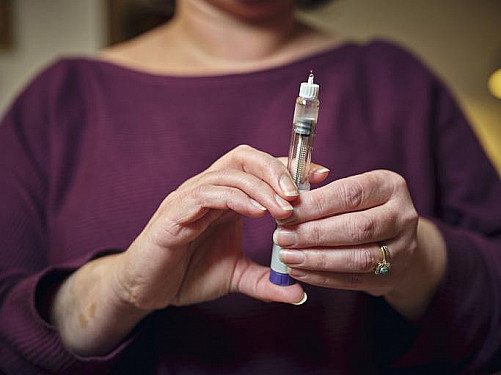4 vaccinations you may need
 Image: Thinkstock Image: Thinkstock |
Keeping one step ahead of the flu is only part of the challenge. It's important to stay up to date with all recommended immunizations.
As you've witnessed, the world is changing fast these days. So are the bacteria and viruses that inhabit the world around us. As new strains develop and spread to different regions, scientists are constantly working to come up with ways to better protect us against them. "New vaccines are developed, existing vaccines are revised, and reasons to give older vaccines change," says Dr. Laura Riley, associate professor of obstetrics, gynecology, and reproductive medicine at Harvard Medical School. She adds that the possibility of new outbreaks, such as H1N1 influenza or a measles epidemic, also need to be considered.
Dr. Riley is one of 15 medical experts on the federal Advisory Committee on Immunization Practices. Each year the committee reviews volumes of evidence on outbreaks of communicable diseases throughout the country, the effectiveness of the vaccines currently used, and how well the vaccines work in the people who receive them. They then send their report to the director of the Centers for Disease Control and Prevention (CDC), who makes annual recommendations for vaccinations for every age group. The recommendations for 2015 are given in the table below.
Since flu season is about to begin, it's a good time to review the vaccines you need and to have them soon. It can take about two to five weeks for a vaccine to become effective. "It's important to check not just your own vaccines but those of any people you take care of, whether they are children or older people," Dr. Riley says. Here are four vaccines you want to make sure you have if you're 65 or older. Because they are recommended, your insurance should cover all of them.
1. The flu shot
 Every year experts predict which of the many strains of influenza virus are going to predominate in the United States and design a vaccine to protect against them. Last year, the flu virus mutated early in the season, so the vaccine wasn't as effective as usual. If you got a flu shot and came down with the flu last winter, don't let that deter you from getting the vaccine this fall. Even if the vaccine isn't a perfect match, people who receive it are likely to have a milder case of the flu than those who don't get the shot. Researchers who looked at three consecutive flu seasons found that people who were vaccinated had a 61% lower risk of being hospitalized for the flu than those who weren't.
Every year experts predict which of the many strains of influenza virus are going to predominate in the United States and design a vaccine to protect against them. Last year, the flu virus mutated early in the season, so the vaccine wasn't as effective as usual. If you got a flu shot and came down with the flu last winter, don't let that deter you from getting the vaccine this fall. Even if the vaccine isn't a perfect match, people who receive it are likely to have a milder case of the flu than those who don't get the shot. Researchers who looked at three consecutive flu seasons found that people who were vaccinated had a 61% lower risk of being hospitalized for the flu than those who weren't.
With rare exceptions, nearly all adults should get an annual flu shot. Pregnant women are at an increased risk of serious illness from the flu, so influenza vaccination is an essential part of preconception, prenatal, and postpartum care.
2. The pneumonia vaccines
When you got your first pneumonia vaccination, you may have been told that you were set for the rest of your life. Now, two pneumonia vaccines are recommended—one, PVC13 (Prevnar 13) protects against 13 strains of the pneumococcus bacterium; the other, PPSV23 (Pneumovax 23) protects against 23 strains. They're advised for all adults 65 or older and younger adults with certain health conditions. If you've had one of the vaccines in the past, you can get the second any time. If you haven't been vaccinated for pneumonia before, don't get both vaccines at once; schedule them at least six months apart. The pneumonia vaccines are 45% to 80% effective against the pneumococcal strains they protect against.
3. The Tdap or Td vaccine
If you didn't have the Tdap (tetanus, diphtheria, and pertussis) vaccine in childhood, you'll need it. If you've been vaccinated, you should have Td (tetanus and diphtheria)—a booster to the Tdap vaccine—every 10 years. It's amazing how a decade can fly by, so you should check with your doctor to see if you need a booster. For pregnant women, a single dose of Tdap is recommended in the third trimester of every pregnancy, so the baby will be protected at birth.
4. The shingles vaccine
The shingles vaccine, Zostavax, offers some protection against the reactivation of the chickenpox virus, varicella-zoster, which—if it awakens from its dormant state within the body—produces shingles, marked by a rash and excruciating pain on one side. Zostavax is recommended for everyone 60 or older, even those who've already suffered through a shingles episode. It's about 70% effective in preventing shingles in people between 60 and 70, but less than 40% effective in older people. However, shingles symptoms are less severe in people who've been vaccinated, whatever their age.
You may have read about a newer shingles vaccine—HZ/su. It has provided 97% protection for people who have received it in clinical trials, and has been just as effective in people over 70 as in younger people. How-ever you may have to wait may be a few years before it is available. In the meantime, don't delay getting Zostavax; you'll still be able to receive HZ/su if and when the FDA approves it.
Additional VaccinesYou—or others in your family—might need these additional shots: HPV vaccine. You might want to encourage teens or young adults in your family to get the human papillomavirus (HPV) vaccine, which is recommended for all females—and males—ages 11 to 26. Although the vaccine has been shown to greatly reduce HPV infection and has already lowered the rate of cervical cancer, only about a third of eligible girls and around 15% of boys have completed the recommended three-shot course. Widespread adoption of the HPV vaccine has the potential to dramatically lower cervical cancer rates among women. Meningococcal vaccine. Two new vaccines to protect against meningococcal type B, which has been spreading through campuses in recent years, were recently approved by the FDA. If you have college students in your family, it's worth discussing this vaccine with your doctor. Vaccines you might have missed in childhood. Talk to your doctor if you never received the measles, mumps, and rubella (MMR) vaccine or the chickenpox vaccine and managed to escape those diseases. You may still benefit from getting those shots. Vaccines for travelers. Although vaccinations for diseases like typhoid fever aren't necessary in the United States, they are essential if you are traveling to some parts of the world. If there's an international winter getaway on your calendar, you can get a general idea of the shots you need at the CDC website, cdc.gov/travel. You should also see your doctor four to six weeks before your trip to arrange for the right vaccinations. Factor the cost of the vaccines into your travel budget; your insurance might not cover them. |

Disclaimer:
As a service to our readers, Harvard Health Publishing provides access to our library of archived content. Please note the date of last review or update on all articles.
No content on this site, regardless of date, should ever be used as a substitute for direct medical advice from your doctor or other qualified clinician.















